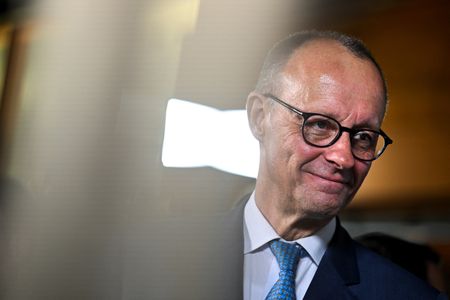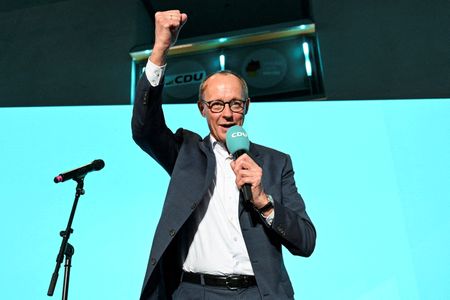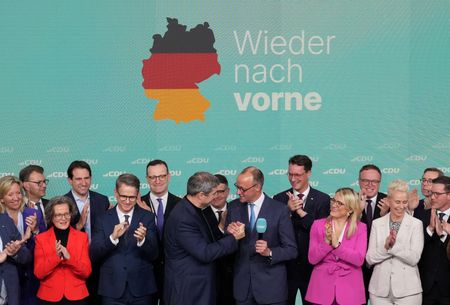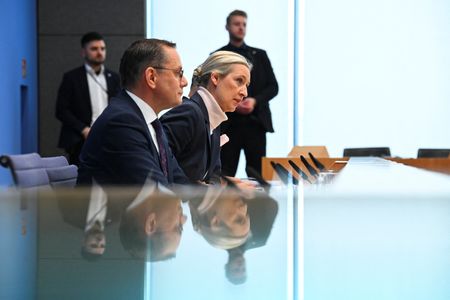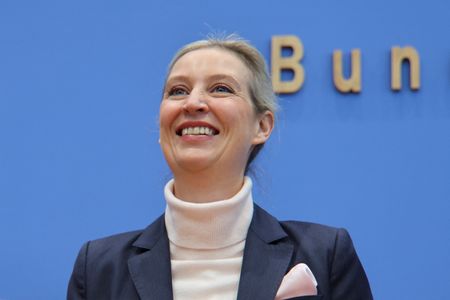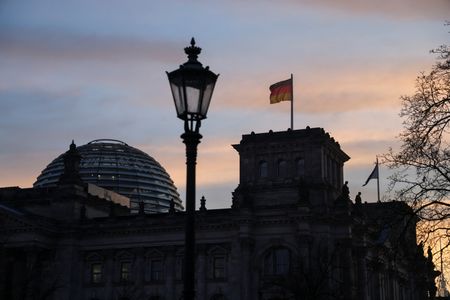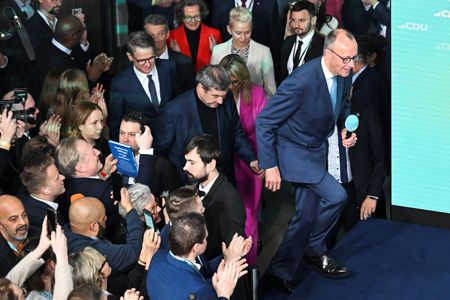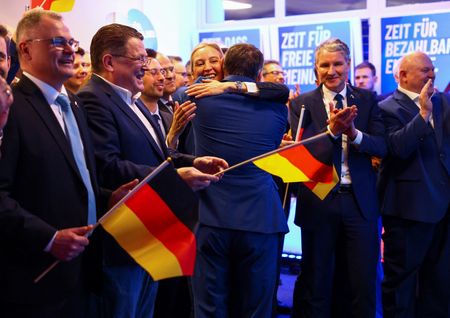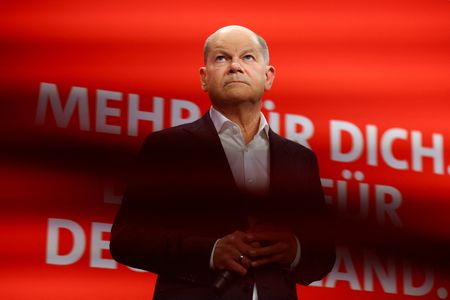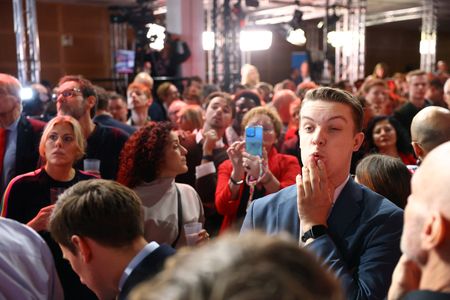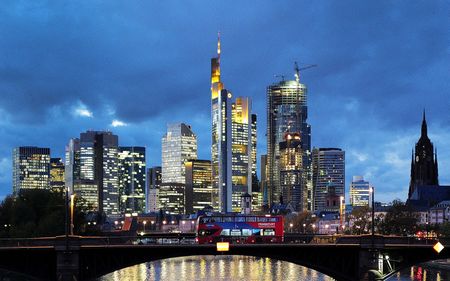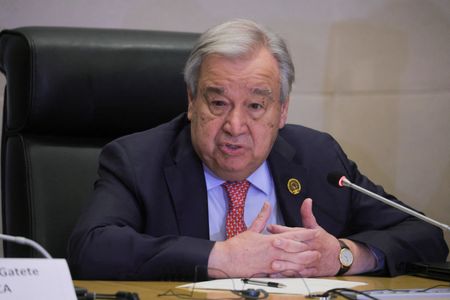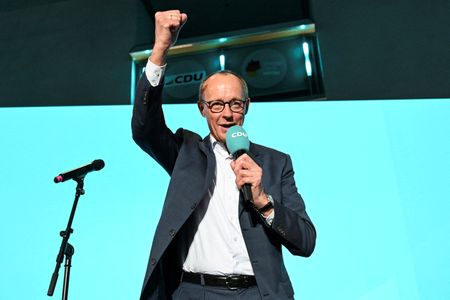By Kirsti Knolle
BERLIN (Reuters) – German conservatives under likely next chancellor Friedrich Merz vowed on Monday to move quickly to try to form a coalition after winning the most votes in a national election that saw far-right and far-left parties gain support from disaffected voters.
Time is pressing for Europe’s ailing largest economy, with society split over migration and its security caught between a confrontational U.S. and an assertive Russia and China.
The most likely outcome of the election is a coalition of the conservative bloc and Olaf Scholz’s Social Democrats (SPD), who came in third, after the far-right Alternative for Germany (AfD) surged to a historic second place.
“From our point of view, (talks) can start very, very quickly,” said senior conservative CDU politician Jens Spahn.
“The first talks should certainly be held this week, in the next few days. We see the situation in the world, Ukraine, Russia, the United States,” he said. “German leadership is needed.”
Merz, who has no previous experience in office, has said he aims to have a government in place by Easter.
The snap election follows the collapse of Scholz’s unloved three-way alliance with the Greens and pro-business Free Democrats (FDP).
In an early indication of his policy intentions, Merz took aim at the U.S. after his win, criticising on Sunday what he called “outrageous” comments from Washington during the campaign, comparing them to hostile interventions from Russia.
“For me, the absolute priority will be to strengthen Europe as quickly as possible so that we can achieve real independence from the USA step by step,” Merz said on Sunday.
His conservative CDU/CSU bloc came in first place on 28.5%, ahead of the far-right Alternative for Germany on 20.8%, its best ever result, according to provisional results.
Mainstream parties, however, rule out working with the AfD, a party which is monitored by German security services on suspicion of extremism but has been endorsed by U.S. figures including billionaire Elon Musk.
A major potential headache is that the AfD and Germany’s radical Left party together garnered one third of the seats in parliament which means they can block changes to the constitution.
That could hamper attempts to loosen Germany’s strict debt rules and any top-up of special funding for defence. Both parties oppose military aid to Ukraine.
TOUGH TALKS AHEAD
Talks will not be easy and the SPD, which scored its worst result since World War Two at just 16.4%, has warned that its participation in a Merz-led coalition is not automatic.
In the election campaign, Merz promised a radical crackdown on immigration on which he said he would make no compromises.
He also drew sharp criticism from the SPD for pushing a parliamentary resolution on migration last month with support from the AfD.
The move was seen by critics as an unforgivable breach of a political quarantine to keep the AfD out of power. SPD politicians said they could no longer trust Merz as a result.
However, the SPD on Monday indicated the door was open to talks.
“If we can find a good basis together, the SPD will be prepared to hold talks because at the end of the day we have to be effective in Germany and we can’t just lick our wounds now,” said Anke Rehlinger, SPD premier of the state of Saarland.
One key question for the economy will be whether the next government loosens the “debt brake”, a constitutionally enshrined limit on state borrowing that critics say has hobbled efforts to lift Germany out of the economic doldrums.
Merz has signalled some willingness to reform the debt brake.
The good news for Merz, whose CDU/CSU may have won but scored its second worst post-war result, is that he will not have to rely on support from the Greens – who won 11.6% – for an outright parliamentary majority.
The new BSW party founded by Sahara Wagenknecht, a former leader of the Left party, known as Linke in German, just missed the 5% threshold required to enter the lower house, making coalition arithmetic easier.
FAR-RIGHT PRESSURE
Analysts say the pressure is on for the next coalition to come together quickly not just to provide more leadership to hold its own against U.S. President Donald Trump, but also to fend off the AfD by showing mainstream parties can answer voters’ concerns.
If it does not, then the 12-year old AfD, which is set to be the largest opposition party in the Bundestag, could be a frontrunner for the next elections set for 2029.
“The German economy needs a new federal government capable of taking action very quickly with a stable majority in the democratic center,” the head of the BDI industry association Peter Leibinger said.
European diplomats are hopeful the next German government will provide more leadership and coordinate better with other capitals than the outgoing three-way coalition of SPD, Greens and FDP that collapsed in November.
Those three parties lost 19.5 percentage points compared with the 2021 election while the AfD and far-left Linke and BS parties together gained around 19.3 percentage points.
(Writing by Sarah Marsh, Matthias Williams, Madeline Chambers in Berlin and Ludwig Burger in Frankfurt; Additional reporting by Barbara Erling in Warsaw; Editing by Michael Perry and Aidan Lewis)

